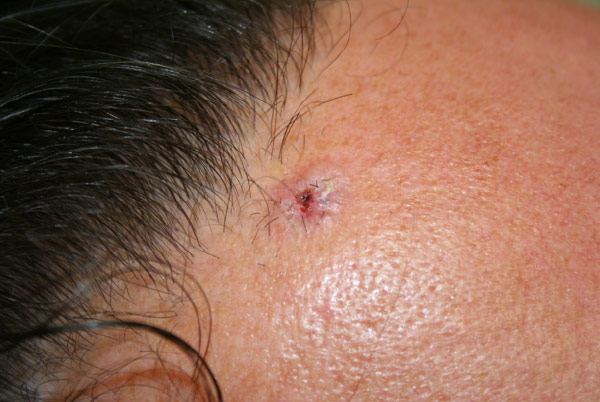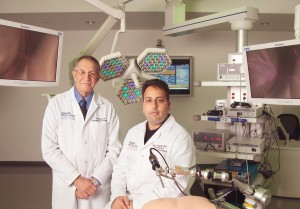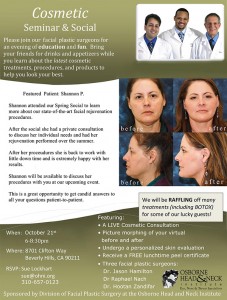- Folded Ear in Newborns: Treatment Options - April 11, 2018
- Newborn Ear Deformity: What Can Be Done? - April 11, 2018
- Ear Molding: An Overview - November 2, 2017
- Otoplasty for Protruding Ears - September 26, 2017
- Basal Cell Carcinoma: Facial Reconstruction Timing - September 26, 2017
- Clinical Considerations of Mohs Reconstruction of Cheek Defect - September 26, 2017
- Basal Cell Carcinoma: Nasal Bridge Reconstruction - September 26, 2017
- Skin Cancers Involving the Eyebrow: Clinical Considerations - October 3, 2016
- Treatment of Multiple Skin Cancer Lesions - June 1, 2016
- Skin Cancer: Nasal Reconstruction and Scar Management - June 1, 2016
Basal cell carcinoma (BCC), the most common form of skin cancer, is also the most common type of cancer overall in the United States. BCC is a slow growing cancer that does not generally metastasize but is characterized by its destructive effects on local structures. Although research into immune mediated factors are thought to play a role in BCC formation, it is generally accepted that excessive ultraviolet radiation (UVB) exposure from the sun is the predominant cause of most cases of BCC.

Who is at risk for basal cell carcinoma?
All people are at risk for developing basal cell carcinoma given sufficient unprotected exposure to ultraviolet radiation. The following factors increase your overall risk for BCC:
- Excessive sun exposure
- Inability to tan
- Fair skin, light eyes, and increased number of skin moles
- Prior history of skin cancer
- Familial history of skin cancer
- Immunosuppression
- Xeroderma pigmentosum (rare skin disorder)
What does basal cell carcinoma look like?
Basal cell carcinoma can have various different appearances. Generally this lesion appears as a smooth nodule or bump that is shinny and has a pearl like appearance. Other appearances that are less common include, a red patch that is similar to eczema or a white scar like lesion.
These lesions can appear on any part of the body but are most commonly seen on surfaces that are exposed to the sun, such as the ears, nose, lips, neck, and head. Because of the variability in appearances, it is highly advisable that all suspected skin lesions be examined by a qualified skin specialist.
How can I prevent basal cell carcinoma?
Because the majority of basal cell carcinomas are related to UV exposure, taking the following protective measures can decrease your risk of developing skin cancer:
- Decrease sun exposure overall especially during peak hours
- Wear sun screen of at least SPF 30 when outdoors
- Wear protective clothing when taking part in outdoor activities
- Avoid tanning bed use
- Obtain regular skin checkups and perform regular checks of your own skin for suspicious lesions.
What are the diagnosis and treatment options?
Basal cell carcinoma is usually diagnosed through biopsy of a suspected lesion. Microscopic examination of the biopsy by a pathologist conclusively determines whether a lesion is cancerous or not.
There are various treatment options for basal cell carcinoma including, Mohs micrographic surgery, radiation, curettage and dissection, and cryotherapy. Only a qualified physician and skin specialist can determine what treatment option is best suited to your specific case
Why should I have my cancer promptly treated?
Although basal cell carcinoma does not spread to distant sites (metastasize) it will invade and destroy local structures. The majority of basal cell carcinomas are located on the face and, as such, have the potential to damage delicate and critical structures of the face, such as the eyes and ears. In addition, disfigurement and undesirable cosmetic outcomes may result if treatment is delayed.
Why should I seek evaluation and treatment from a skin specialist?
A skin specialist is trained to recognize suspicious skin lesions and biopsy them to provide a definitive diagnosis. In addition, these surgeons posses superior surgical skills enabling them to effectively excise lesions while preserving the aesthetic elements of the affected region.
The skin specialists of the Osborne Head and Neck Institute are double board certified in otolaryngology (ENT) and plastic and reconstructive surgery. This unique combination of specialties allows these surgeons to address the functional and cosmetic concerns inherent to skin cancer treatment. Due to their advanced training and cutting edge techniques the skin specialists of OHNI are world renown for their unparalleled superior outcomes.



